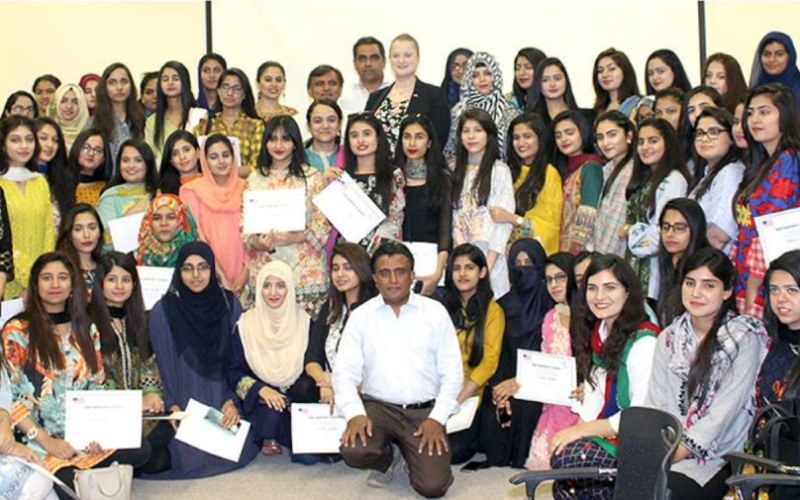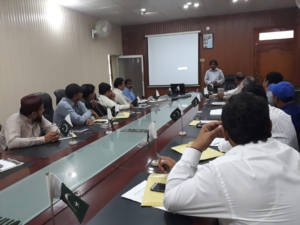Ali Abid has been a journalist with Pakistan’s different English newspapers for the last 20 years. Therefore, the first interaction of this Sheikhupura-based career journalist on Twitter, his blog, and even Youtube was hard to miss.
Earlier, his brush with digital technology was only to mail his news stories to the newsroom.
He learned how to use digital journalism tools and techniques for self-branding, news accuracy, crowdsourcing, data journalism and mobile phone journalism at a workshop, “Digital Empowerment of Journalists,” held in Sheikhupura on April 6 and 7 with the support of the US Mission in collaboration with the Pakistan-US Alumni Network (PUAN).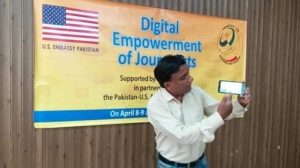
“I feel I’ve missed lots of time and lots of opportunities by not using digital journalism techniques in my career,” remarked Abid. He is now determined to use social media sites and online sources to promote his content as well as to gather news.
Such workshops were held in Kasur on April 4 and 5; Sheikhupura on April 6 and 7; Okara on April 8 and 9 and Lahore on April 10 and 11. Over 150 working journalists and student-journalists started their online journalism in these venues during hands-on activities.
“This workshop did not lecture us most of the time, but engaged us in practical work like using digital tools to detect misleading or fake content, capturing the best footage using a smartphone, and creating blogs, Youtube channels, podcast and twitter accounts,” noted Naeem Sheikh, a Sahiwal-based TV reporter, who had attended the Okara workshop.
Kasur workshop participants saw most of their areas so far uncharted, as their culture, architecture, rites, people and saints remained hidden from the world due to lack of projection on social media. Afzal Ansari, a print journalist, asserted that the print media had a limitation of space and time.
“A print story doesn’t tell everything because of the space constraints; the untold aspects can be brought to the world through a blog,” he added as he pledged to turn to blogs and tell untold stories. The workshop in Lahore was dominated by student journalists from the Lahore College for Women’s University, Punjab University and FC College as well as working journalists from print and electronic media.
Participants were given a target to post blogs, podcasts, video shows and tweets for career growth in the next three months. Lead trainer and International Center for Journalists alumnus, Ahsan Raza, said that the future of journalism was digital, and that meant it depended on technology.
He added that in the age of media recession, digital journalism could provide space, opportunities and money to working and aspiring journalist. Trainers Rehan Hyder, Sarfraz Ali, Sana Rasool, Nazia Jabeen, Moneeba Iftikhar, Mubasher Bukhari and Rizwan Safdar worked with the participants; making their digital journey easier.
Hyder introduced online tools for news accuracy and crowdsourcing while Ali motivated participants to use Youtube to break censorship and earn money.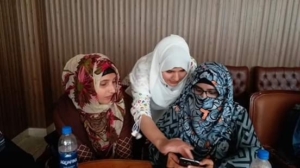
Rasool would introduce podcasting techniques as Jabeen, a civil servant, inspired the participants to do digital journalism because the government might introduce advertisement quota for online sites. Iftikhar spoke on citizen journalism whereas Bukhari stressed on accuracy. Safdar worked with participants on how to best use a smartphone for capturing photo and video footage.
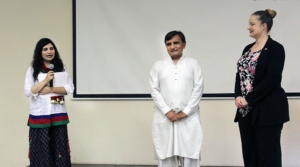
U.S. Consulate General, Lahore, Deputy US public affairs officer, Elizabeth Lee at the closing ceremony.
The U.S. Consulate General, Lahore, Deputy Public Affairs Officer, Elizabeth Lee, distributed certificates to participants in Lahore. She asserted that the US government was immensely proud to support the PUAN Small Grant Program.
While speaking in Urdu, she asked the participants whether they liked the workshop.
“Yes,” they shouted in a chorus. “Bahut Shukria (Thank you so much),” she smiled and concluded her speech.
This article (Journalists use PUAN’s initiative to embrace the digital age) was originally published in the Daily Times on April 14, 2019.
If you are an alumn of the U.S. Government-funded exchange program and registered with the PUAN database, you are eligible to apply for the grant. To apply visit: www.pakusalumninetwork.org/grants/. To register with PUAN visit: www.puan.pk/alumniregistration.
